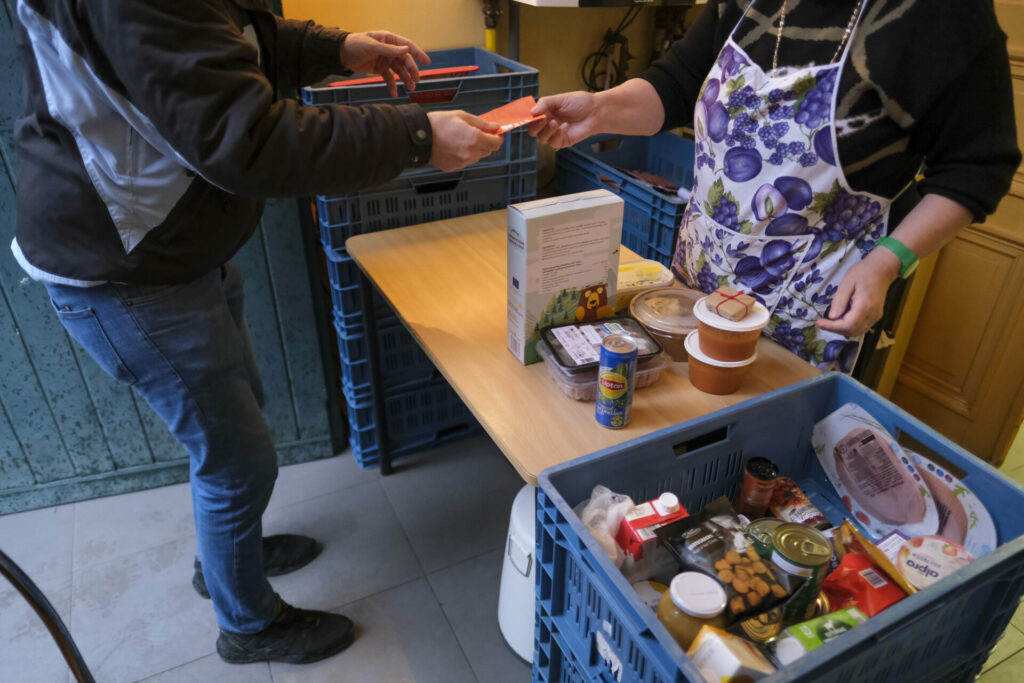Almost 20% of the Brussels population has at some point relied on food aid. Several NGOs ensure the hungry are fed, but with competition from commercial companies and the franchising of supermarkets, this has become an uphill battle.
In Brussels, 90,000 households rely on food aid. Food aid solidarity in the Capital Region is coordinated by LOCO – a network of eight organisations, spread across eight municipalities. Through its network of local antennae, it collects and redistributes more than 1,400 tonnes of unsold food every year to its partners and various smaller associations.
Benjamin Peltier of L'Ilot, the non-profit association with a focus on homelessness, sits on the LOCO Board of Directors. He explained the challenges the teams face: "The services that LOCO is delivering are becoming saturated," he told The Brussels Times. "More people are asking for food aid than LOCO can provide."
This is largely a result of successive crises, including the energy and cost of living crises. "The situation is getting more and more complicated. Almost all the organisations in this situation have to turn people away because they don't have enough food to give out."
Profiting from unsold food
The LOCO network mainly gets food that is redistributed through donations from shops, supermarkets and hypermarkets. However, the donations it receives are gradually diminishing: "After growing for several years and capturing more unsold stock, we have now reached a point where donations are diminishing," Peltier said.
One competitor comes in the form of start-ups that brand themselves as anti-waste. Peltier was eager to stress that Too Good To Go, which focuses on smaller local shops and eateries, doesn't pose too much competition. "This complements our system rather than interferes with it."
However, a start-up called Happy Market resells unsold supermarket produce at a reduced price and offers to buy these products from these large stores. This has led to severe complications. "When supermarkets give their unsold food to us, they get the VAT (6%) back, but if they sell to Happy Hours Market, they can sell them at 25% of the price. Now, we're losing more and more shops to Happy Hours Market."

Credit: Belgian Federation of Food Banks
The Brussels Government recently approved a draft ordinance that lays out a framework to manage unsold food and combat waste by prioritising the needs of charitable organisations. If passed, it will oblige supermarkets larger than 1,000 m² (around 100 in Brussels) to offer their unsold food one day before the expiry date to charities. Only after having done this can they offer to private resellers such as Happy Hours Market.
"This is a source of hope but it remains to be seen whether the supermarkets will play along. There are always ways of getting around the rules." Peltier explains that currently there are no provisions in the proposal that could stop supermarkets from selling their unsold products two days before the expiry date.
"The spirit in which the regulation was made is encouraging, but we'll have to see whether it changes things in practice." He also lamented that it concerns only a small portion of Brussels supermarkets.
Finances of franchised stores
Peltier sees the greatest challenge as the disruption of previous arrangements by the franchising of supermarkets. "We often dealt directly with retailers before. We used to talk to Delhaize's national office and had agreements with them to ensure donations."
But many of these chains, including Carrefour and Intermarché, are gradually becoming privatised. "Now independent owners are in charge of the sops, and they oversee their own policy." The food aid sector gradually lost almost all the Brussels Delhaizes as they switched to Happy Hours Market.
He explained that many of these independent shop owners are in a very complicated financial situation. "It's very difficult for them to be profitable. When a company like Happy Hours Market comes along and offers them money, they can't refuse it because they need all they can get. These conditions make it easier for a company like that to establish itself."
Related News
- Lack of volunteers forces Belgian charities to reduce operations
- Are food waste apps socially conscious? Charities denounce new competition
Peltier noted that every year, the donations from stores are decreasing. However, LOCO has become more resourceful as a result. "Before we relied almost exclusively on supermarket donations. Now we get our food straight from producers, factories, and distribution centres. We also work with a new service in Brussels that recovers leftover food from events."
The Brussels Government will also increase its financial support to supply logistics platforms to strengthen and optimise the management of these flows of unsold food products if the supermarket obligation proposal comes into force.

